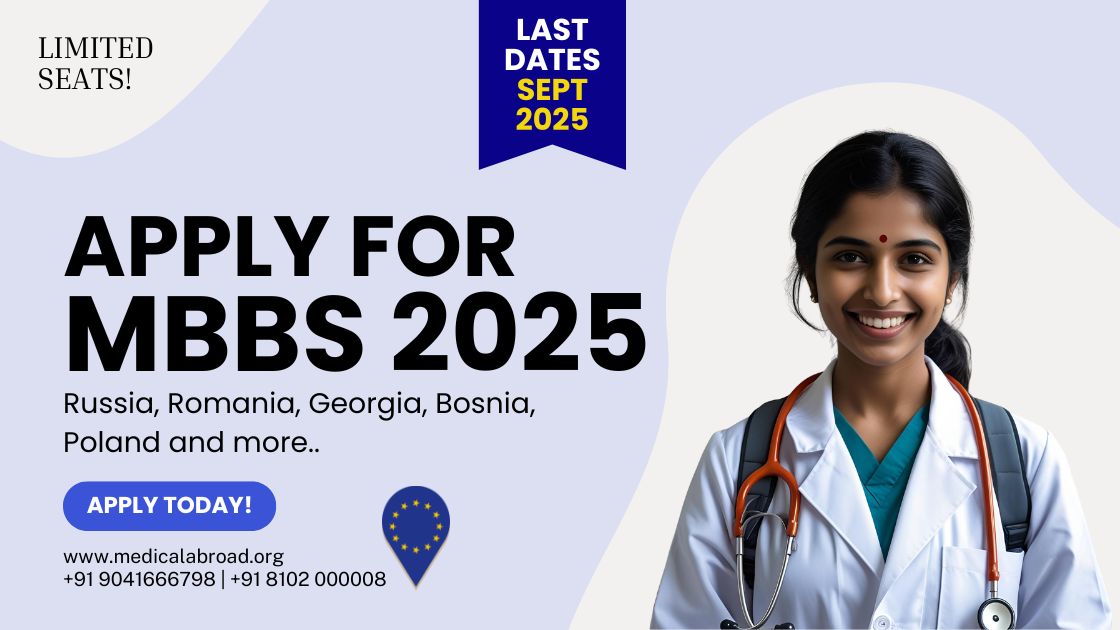Medicine studies in Europe provide multiple benefits beyond degree recognition because they create life-altering educational experiences. Studying medicine in countries such as Bosnia and Georgia and Serbia and Romania offers Indian students valuable experiences in diverse cultures and offers reasonable prices and top educational standards and leads to a satisfying way of life.
This exhaustive guide reveals every detail of medical student life in Europe including their academic schedules together with their cultural immersion as well as their food habits and living expenses and regular day-to-day activities and weekend recreational opportunities.
1. The First Arrival: Settling into a New Life
Students enter European territory with both positive anticipation and nervous energy. Traditional onboarding processes at universities become seamless because institutions provide several steps as listed below:
- Airport pickups
- Hostel allocations
- SIM card and banking setup
- Orientation programs
- Local tours and city guides
During your first few weeks of university you will adapt to campus life by familiarizing yourself with spaces and people while seeking Indian grocery stores and handling both time zone challenges and unusual weather conditions.
2. Academic Life: Structured, Practical, and Student-Centered
Medical universities in Europe use the European Credit Transfer and Accumulation System (ECTS) to deliver programs which satisfy international medical education requirements. Medical programs disperse among six years with pre-clinical and clinical components respectively.
Weekday Routine:
Morning (8:00 AM – 12:00 PM):
- Lectures in Anatomy, Physiology, Pathology, Pharmacology
- Classrooms are equipped with projectors, smart boards, and multimedia resources
- Most courses are taught in English for international students
Afternoon (1:00 PM – 4:00 PM):
- Practical labs: dissection, biochemistry, microbiology
- Case-based discussions and patient simulations
- From the 3rd year, clinical rotations in university-affiliated hospitals
Evenings (4:30 PM – 8:00 PM):
- Self-study or group study sessions in libraries or hostel lounges
- Assignments, presentations, and preparation for internal assessments
- Some students also take part in online electives or research projects
Assessment Style:
- Internal exams after every module
- Mid-semester and end-semester exams
- OSCE (Objective Structured Clinical Exams) for clinical years
- Viva voce, written papers, and lab practicals
3. A World of Culture: Festivals, History, and Local Life
The historical past of Europe includes Roman antiquity alongside Ottoman constructions and remnants from Soviet times.
Cultural Highlights for Indian Students:
- Cultural societies organize celebrations for important Indian holidays including Diwali along with Holi and Onam and Navratri festivals.
- Students should join celebrations of Orthodox Christmas and Easter together with National Days and Wine Festivals that take place in the local area.
- Students from different national backgrounds organize evenings where they display their performances and foods along with their musical traditions.
- Students who attend weekend classes can acquire essential words and expressions in Romanian, Georgian, Bosnian or Serbian.
Local Attitudes:
- People in student towns show particular friendliness towards students and locals greet them well.
- Many young people speak English
- The student population receives a positive reputation from their fellow peers and the general student body.
4. Food: A Mix of New and Familiar Flavors
Indian students fear food-related issues most among all their concerns. Europe provides its residents with both traditional delicious local food and continuing expansion of Indian restaurant and grocery outlets.
What’s on the Plate?
Local Dishes:
- Bosnia: Burek (stuffed pastry), Cevapi (grilled meat), Pita (savory pies)
- Romania: Sarmale (cabbage rolls), Ciorbă (sour soups)
- Georgia: Khinkali (dumplings), Khachapuri (cheese bread)
- Serbia: Gibanica (cheese pie), Sarma, Ajvar (pepper spread)
Indian Cuisine Options:
- Indian restaurants available in most university cities
- International food stores offer masalas besides pulses and ready-to-eat meals among their product range.
- Most students boil their dishes at the communal hostel kitchens.
Pro tip: Basic cooking skills acquired before international travel will help you save money and give you peace of mind.
5. Accommodation: Hostels vs Private Rentals
University Hostels:
- Shared rooms (2-4 students), basic furnishing
- Monthly cost: €100–€150
- Usually located within walking distance from the university
Private Apartments:
- More privacy, often shared with friends
- Fully furnished options available near campuses
- Monthly rent: €150–€300, depending on city and type
6. Living Costs: A Major Advantage
One of the biggest attractions of Europe is affordability. Here’s a breakdown of typical monthly expenses for students:
| Expense Category | Average Cost (in Euro) |
| Rent (hostel/shared) | €100–€250 |
| Food and Groceries | €100–€150 |
| Transportation | €10–€20 (monthly pass) |
| Mobile & Internet | €10–€15 |
| Entertainment | €30–€50 |
| Miscellaneous | €50–€70 |
| Total | €300–€450 |
That’s roughly ₹25,000–₹38,000/month, significantly lower than many other countries.
7. Weekends and Social Life
The schedule of academic intensity during weekdays makes way for relaxation and entertainment which begins on weekends.
Common Weekend Activities:
- Group members take advantage of European mobility agreements to visit different towns and countries within the Schengen territory.
- The weekend activities include visiting museums together with cafes and shopping in malls and watching movies while exploring historical sites.
- Trekking is available in winter along with skiing and beach visits occur in summer.
- Student clubs at school organize multiple activities such as sports competitions, dance presentations, theatrical productions and debate competitions and photographic exhibitions.
Travel-Friendly Perks:
- Student train/bus discounts
- The ability to travel visa-free to neighboring nations depends on the residence conditions of each student
8. Safety, Healthcare, and Support
Students from other countries will find Europe to be a safe educational destination. University towns specifically maintain a protective living environment that welcomes students.
Key Points:
- The health insurance coverage provided to students is mandatory.
- University students can access both student clinics and facilities of the hospital partners.
- Emergency services are efficient
- The research shows that female students experience security when using public transportation and walking on city streets during nighttime.
9. Challenges and How Students Overcome Them
Every journey comes with hurdles. The following section outlines typical obstacles together with methods to deal with them.
| Challenge | How to Overcome |
| Language Barrier | Use Google Translate alongside attending free language courses. |
| Homesickness | Engage in school clubs while staying online with relatives. |
| Winter Climate | Put on multiple clothing items while purchasing efficient heating equipment. |
| Cultural Differences | Act with a receptive attitude while being respectful toward the established social practices. |
10. Student Voices: Real Stories
I felt nervous upon my arrival in Bosnia. My university friends and hostel mates evolved into a true family bond. Instead of feeling scared when I arrived in Bosnia I learned how to cook while picking up basic Bosnian language abilities and performing in a local dance event. – Priya M., MBBS Year 3
Studying in Tbilisi brought significant life transformations to me. The experience of helping medical staff during COVID led me to prepare for NEXT and USMLE exams. – Amit R., Final Year MBBS
Final Thoughts
MBBS study in Europe involves more than medical textbooks and clinical work because it enables students to establish their future. The pursuit combines geographical discovery with eating with multicultural roommates while gaining independence before you finally achieve your goal as a doctor.
Aspiring medical students from India and the broader world find Europe to be their new educational hub thanks to affordable costs of living and top-notch educational institutions and charming cultural environments along with invaluable life experiences.
Ready to Take the First Step?
Call us: +91 9041-666798 / +91 8102-000008
Email: [email protected]
Visit: www.medicalabroad.org
Let Worlin Education guide you through every step—from choosing the right university, visa processing, to settling down abroad.


